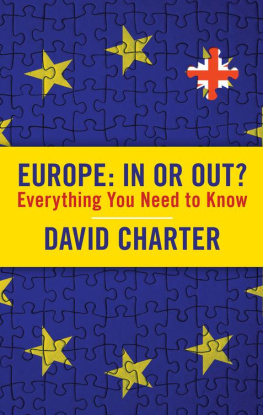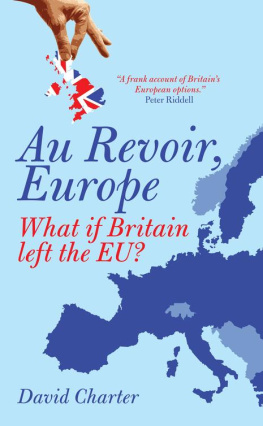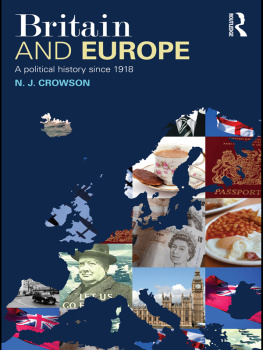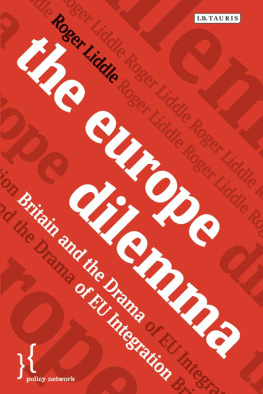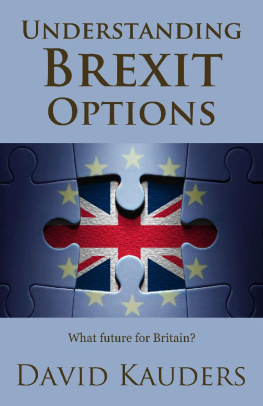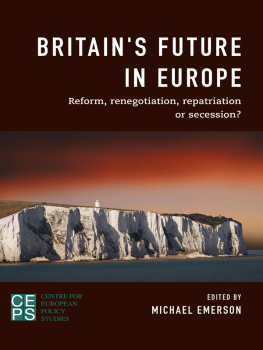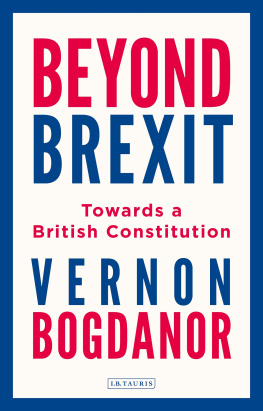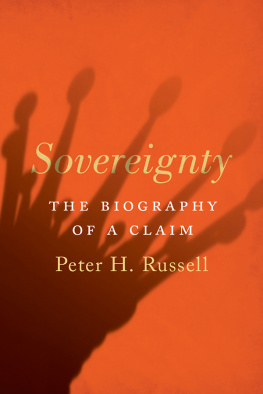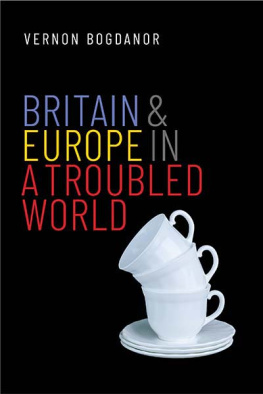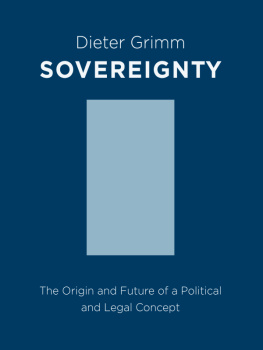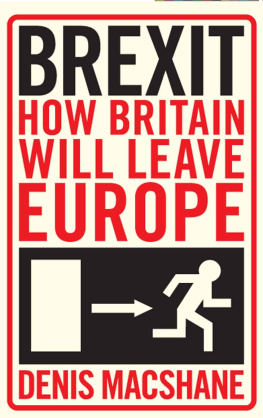F or us, the European Union is a means to an end prosperity, stability, the anchor of freedom and democracy both within Europe and beyond her shores not an end in itself. We insistently ask: How? Why? To what end?
With these words, David Cameron introduced his plan for the next chapter of Britains turbulent relationship with its nearest neighbours a referendum on membership of the European Union. This book looks at the main aspects of Britains dealings with the 28-nation organisation, the achievements and the aggravations, and asks in each case what it would mean to walk away. The pros and cons are explained in ten themes including democracy, prosperity and sovereignty, and in ten sectors where the EU most impacts everyday life in Britain such as finance, farming and fishing. Cameron proposed to reform the EU to return some of its powers back to the national level, in the hope of making it more acceptable to the British public before holding a popular vote. He made clear that his preference was to stay in the club because of the central importance of the Single Market for British businesses and British jobs. But his choice of words betrayed the ambiguity that has always characterised British involvement in Europe. The questions How? Why? To what end? are a common reaction on these islands to the seemingly remorseless momentum towards further continental integration. They suggest a baffled detachment, a heavy dose of reluctance and more than a hint of suspicion.
In his announcement of Conservative plans for a referendum in 2017, known as the Bloomberg speech because it was delivered at an American financial news agency, Cameron went on to say that the EU needed to change to become more flexible, adaptable and open by ditching spurious regulation which damages Europes competitiveness and to prove that some powers can in fact be returned to member states. Those who suggested that meaningful reforms would simply be blocked were being defeatist despite the requirement for unanimous agreement by the other twenty-seven nations for any fundamental change of the EUs ruling treaties. It was one of the most anticipated political speeches of the year and potentially one of the most significant of Camerons premiership. It was delayed for months as the precise wording, the balance between support and criticism of the EU, and even the venue were endlessly haggled over. It was not a speech he ever wanted to make.
The Prime Minister was pushed into announcing a referendum by a large group of eurosceptic MPs in his own ranks, as well as by pressure from the media and a popular mood of disenchantment with the EU that saw a dramatic increase in support for the UK Independence Party, a political party founded to campaign for British withdrawal from Brussels. The rise of UKIP was not just down to anger at Europe, although this was the reason it was formed at the time of the Maastricht Treaty which created the European Union. UKIP also thrived on popular anger at high levels of immigration and discontent with a political class that seemed out of touch with parts of the electorate. Nevertheless, many Conservative Party MPs felt that a referendum on EU membership would be a good way of pleasing their grass roots as well as neutralising UKIPs appeal. A referendum could also win support from voters across the political spectrum who had not had a say on Britains relationship with Europe for four decades.
Labour avoided rushing to match Camerons referendum promise. But in 1975 it was the Labour government of Harold Wilson that set the precedent with the countrys first ballot on Europe, when the UK decided by an overwhelming two to one to stay in the European Economic Community (EEC), the forerunner of todays EU. In the depths of the Cold War and with Britain plagued by high inflation and the Three-Day Week, there was a powerful case for linking up with our continental allies. Much has changed since then. Globalisation, the fall of Communism and the emergence of developing powers like Brazil, China and India have given Britain a range of international economic options unimaginable in the 1970s. The EEC itself has been transformed, most notably by the Maastricht Treaty of 1993 that turned it into the European Union and set up the euro.
The six-nation group expanded to nine members when the UK joined in 1973 along with Denmark and Ireland, and the organisation kept growing, with the historic enlargements of 2004, 2007 and 2013 bringing eleven former Iron Curtain countries into the club. Britain was the driving force behind both the expansion and the creation of the Single Market in the 1980s which entailed abandoning the right to veto European laws in many policy areas. Further concessions of national sovereignty were made to extend EU legislative power over employment and social conditions, as well as judicial and police cooperation. The Lisbon Treaty of 2009 added the European External Action Service the EUs own version of the Foreign Office with branches in almost every country of the world. Public consent for these steps towards broader and deeper continental integration was never sought in a referendum although Ireland held popular votes every time a major treaty transferred new powers to Brussels.
Frustration among the public, politicians and the media grew as the referendum option was seemingly promised by British political leaders only to be cancelled or avoided. Tony Blair said that there would be a public vote on the proposed EU Constitution in 2005, only to call it off after the French and Dutch had both voted against the document and effectively sent it back to the drawing board. Most of the proposed changes were repackaged into the Lisbon Treaty but the Labour government under Gordon Brown refused to put it to a referendum, arguing that there was no tradition for a public vote on a treaty that simply updated EU rules. Labours argument was undermined when Valry Giscard dEstaing, the former French President who oversaw the drafting of the ill-fated Constitution, welcomed the Lisbon Treaty by declaring: The text is, in fact, a rerun of a great part of the substance of the Constitutional Treaty. In an article in The Sun newspaper in 2007, David Cameron, while Leader of the Opposition, said: Today I will give this cast-iron guarantee: if I become PM a Conservative government will hold a referendum on any EU treaty that emerges from these negotiations. Two years later, after the Czech Republic became the final EU country to ratify the Lisbon Treaty, Cameron, still in opposition, abandoned his referendum pledge. The changes were set in legal cement sadly our battle to stop this EU treaty has come to an end, he said.
David Cameron instinctively felt that a fight over Europe would be a diversion from his core task as Prime Minister of rebuilding the economy. That is why he told the Conservatives annual conference in 2006 that the party needed to drop its obsession with the EU.
For too long, instead of talking about the things that most people care about, we talked about what we cared about most. While parents worried about childcare, getting the kids to school, balancing work and family life, we were banging on about Europe.
That warning seems a long time ago now. In the same article in which he dropped his cast-iron guarantee of a referendum on the Lisbon Treaty, he admitted the real reason why he did not want to bang on about the EU: The to-do list for the next government is long and daunting. That is why I know that if we win that election, we cannot afford to waste time having a row with Europe. For Cameron, Europe was not a core issue. It was a time waster. Many in his party felt differently, however, and bit by bit he was pushed into the position of announcing a referendum, even if his coalition with the pro-EU Liberal Democrats meant that he could only deliver it if re-elected in 2015 with a Conservative majority. Cameron said that he needed time for a renegotiation of the UKs terms of membership before a public vote by the end of 2017. The reason to play for time was clear opinion polls suggested that an immediate in/out referendum would be too close to call, while a successful renegotiation could win round decisive numbers of voters.

